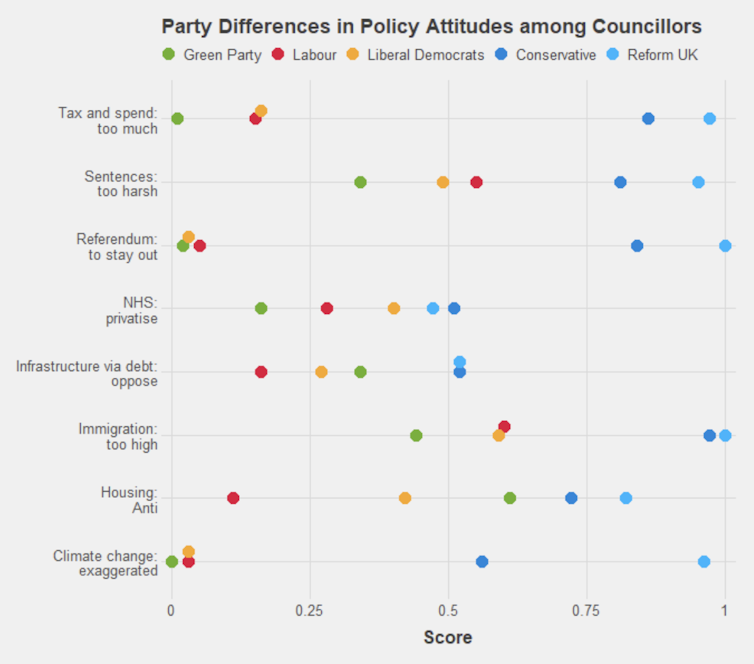Reform UK has positioned itself as the voice of discontent in British politics – a home for voters who feel both Labour and the Conservatives have lost touch with ordinary people.
Following elections in May, Reform is now a significant presence in local government with 921 councillors across England. The party pitched itself as an alternative to the traditional mainstream parties – we wanted to see whether this was actually the case on the local level.
We found Reform councillors to be less in favour of building in their local area and more interested in seeing government money spent on crime and policing than their colleagues from other parties.
This research is based on survey responses from councillors across the four largest parties — the Green party, Labour, Liberal Democrats and Conservatives — which we conducted as part of our report What Do British Politicians Think? A study into the views of MPs, councillors, and the public. The survey was carried out between January and February 2025 and we then conducted a follow-up survey of Reform UK councillors after the May local elections. This ran between August and September.
We rated the councillors’ responses to some questions on a 0-1 scale. When asked about immigration, for example, a rating of 0 suggests the councillor thought immigration too low, and 1 that they thought it too high. On this issue, Reform UK scored 1 – every councillor surveyed thought immigration had been too high.
Conservative councillors were not far off, with a score of 0.97. Labour and Liberal Democrats were roughly equal at 0.6 and 0.59 respectively, leaning towards too high, whereas Green councillors were slightly more likely to say immigration had been too low, with a placement of 0.44. This reflects one of the key dividing lines in British politics today, but also suggests that the more pro-immigration messages pushed by Labour and the Liberal Democrats nationally may not be overly popular among their councillor bases.

Labour councillors (perhaps reflecting the stated preferences of the party in government) were more in favour of ramping up building works than other parties. Tory and Reform councillors were more likely to oppose investment in large infrastructure projects in the UK if that also meant government borrowing had to increase significantly in order to fund them. Reform councillors were the most strongly opposed to a large increase in new housing in their area. The Conservatives and Greens were also more likely to be opposed while Lib Dems were somewhere in the middle. Labour councillors were, again, most in favour.
NHS, tax and spend, crime and policing
We found that 96% of Reform councillors think concerns over climate change have been exaggerated, compared to no Green councillors believing this (and just 3% of Liberal Democrat and Labour councillors). On whether the courts are too harsh, Reform councillors were most likely to say not harsh enough, followed by the Conservatives. The Greens are the least likely to say they are too harsh, whereas Labour and the Liberal Democrats are more toward the centre. On the issue of NHS provision, only the Conservative councillors leant towards privatisation. Reform followed behind but privatisation was still a minority view. The other parties all skewed towards maintaining public provision.
On tax and spend, the parties cluster more clearly – the Greens, Labour and Liberal Democrats want more tax and spending whereas the Conservatives and Reform both want a smaller state.
Asked in which areas the government should spend more money, the Conservatives and Reform councillors both selected the same top three areas (although not in the same order) – crime and policing, defence and education. Labour and the Liberal Democrats also chose the same three areas (again, not in the same order) – the NHS, local government and education. Green councillors chose the environment as the area most deserving of extra spending, followed by the NHS and with local government and education neck-and-neck.
Our polling suggests that a clear divide exists in local government along overlapping economic and cultural lines. Reform councillors typically take the most rightwing positions (except on the NHS), followed by the Conservatives, including on the tax and spend question. There is often little difference between Labour and the Liberal Democrats on the centre left/left, and then the Greens take the most leftwing position.
The one area where this does not hold up, however, is building. Here, the Greens become somewhat aligned with Reform and the Conservatives in their more sceptical views, whereas Labour and the Lib Dems are more in favour – reflecting tensions between environmental priorities, local preferences and economic growth.
The research presented in this report was made possible by funding from a British Academy/Leverhulme Small Research Grant (SRG24\240513).
This article was originally published on The Conversation. Read the original article.







